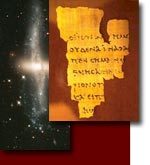| Site Map | Contacts | Links | Newsletter | |
Old Testament:
Church Fathers
The early church fathers is another source for OT quotations, and how they understood the OT text. We will now look at some of the important early church fathers who wrote major books on Genesis.
Origen was born about 185 AD in Alexandria. He was a great scholar and author. His greatest work was the Hexapla which put in parallel columns the Hebrew text of the OT, a Greek transliteration, the Greek translation of Aquila, Symmachus, and Theodotion, and the LXX. In his major work on theology called First Principles, he expounds on creation. He also wrote homilies on Genesis and Psalms. He is known for his allegorical interpretation of scripture.
Basil preached one of the oldest series of sermons (nine in all) on six days of creation called the Hexaemeron. These homilies were held in high esteem by the early church fathers. St. Basil spoke these sermons extemporaneously to the elite at Caesarea in Cappadocian. Along with his brother Gregory of Nyssa and his friend Gregory of Nazianzus they are know as the "Cappadocian Fathers." Basil was born about 330 AD and succeeded Eusebius as bishop of Caesarea in 370 and died in 379 AD.
Ambrose in 374 was elected bishop of Milan, Italy. He even borrowed from St. Basil's sermons to develop his own nine homilies on the six days of creation called the Hexameron.
Jerome was born about 345 AD. Jerome was commissioned by Pope Damascus around 382 to translate the Bible into Latin. In 386 he settled in Bethlehem in seclusion to complete his translation. It took him 23 years to do this. It is called the Vulgate. St. Jerome also wrote Hebrew Questions on Genesis. He died in 420 AD.
Augustine was born in 354 AD in Northern Africa. He became a follower of Manicheism for nine years before becoming disillusioned with it. St. Ambrose led him to orthodox faith. In 396 he became the bishop of Hippo. His early work is Confessions then later the City of God. Less well known is his three works on Genesis. The first one, On Genesis Against the Manichees, was written about 389 AD. The second one, On the Literal Interpretation of Genesis: An Unfinished Book, was written about 393 AD, but not finished. The third and longest (12 books) is On Genesis Literally Interpreted which was written after 404 AD. In the last three books of his Confessions he talks about Genesis and lastly again in the eleventh book of the City of God which was written about 417 AD. He died in 430 AD.
